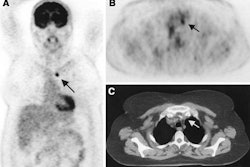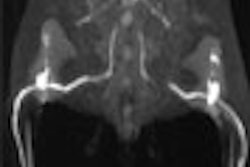Radiation directed at the specific tumor site may be as effective as whole-breast radiation therapy in halting breast cancer recurrence in women who have undergone breast-conserving surgery, according to a five-year study conducted by researchers at William Beaumont Hospital in Royal Oak, MI. Their results were published in the Journal of the National Cancer Institute.
Standard treatment normally includes whole-breast radiation therapy for women with early-stage breast cancer who have undergone breast-conserving surgery.
"This study has both scientific and clinical ramifications. Scientifically, it raises the question of whether whole-breast radiation is needed in some cases. Secondly, if we make it simple for patients to have radiation, breast-conservation therapy becomes a more appealing option," said lead researcher Dr. Frank Vicini.
For this study, researchers compared rates of local recurrence between 199 women (considered to be at low risk) who received limited-field radiation, and 199 matched control women treated with breast-conserving surgery. Women were paired by age, size of tumor, lymph-node status, margins of excision, estrogen receptor status, and administration of adjuvant tamoxifen therapy (JNCI, August 20, 2003, Vol. 95:16, pp.1205-1211).
The median follow-up for surviving patients was 65 months. Ipsilateral breast recurrence was observed in five patients treated with limited-field radiation therapy. The cumulative incidence of local recurrence was 1% (95% confidence interval).
The authors found no noticeable difference in the median time to recurrence and the rate of local recurrence between the two groups of women. In addition, there was no difference in the rates of distant metastases or survival.
However, larger clinical trials are still necessary, commented Dr. Paul Wallner, chief of the clinical radiation oncology branch of the National Cancer Institute in Rockville, MD.
"We do recognize that various treatments have become ‘standard’ prior to being subjected to randomized trials and that some have indeed proven to be beneficial. Unfortunately, that is not always the case," Wallner said. "This study raises questions since follow-up is shorter than usually considered acceptable for evaluation of definitive breast cancer therapies, and many patients received tamoxifen, which can delay recurrence."
While the clinical information may be slow to filter in, patients are already asking about this type of therapy, Vicini pointed out. "Our goal is to make breast-conserving therapy more accessible to patients."
By Jerry IngramAuntMinnie.com contributing writer
August 25, 2003
Related Reading
Irradiation of mammary lymph nodes may improve high-risk breast cancer survival, August 13, 2003
Long-term survival similar with mastectomy or breast-conserving therapy, July 28, 2003
Radiotherapy benefits patients with DCIS, July 11, 2003
Copyright © 2003 AuntMinnie.com



















